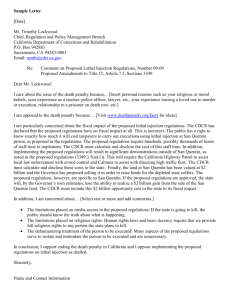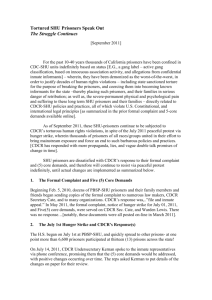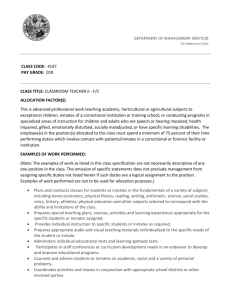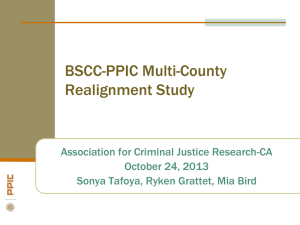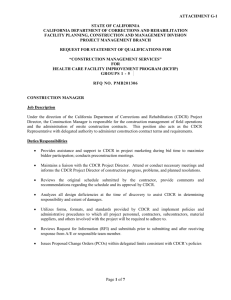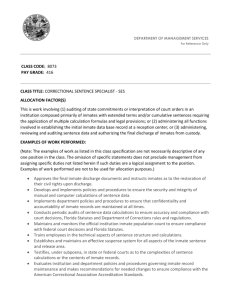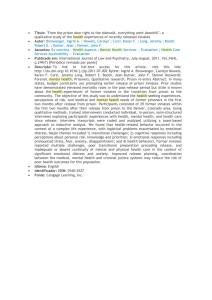Sen. Appropriations
advertisement
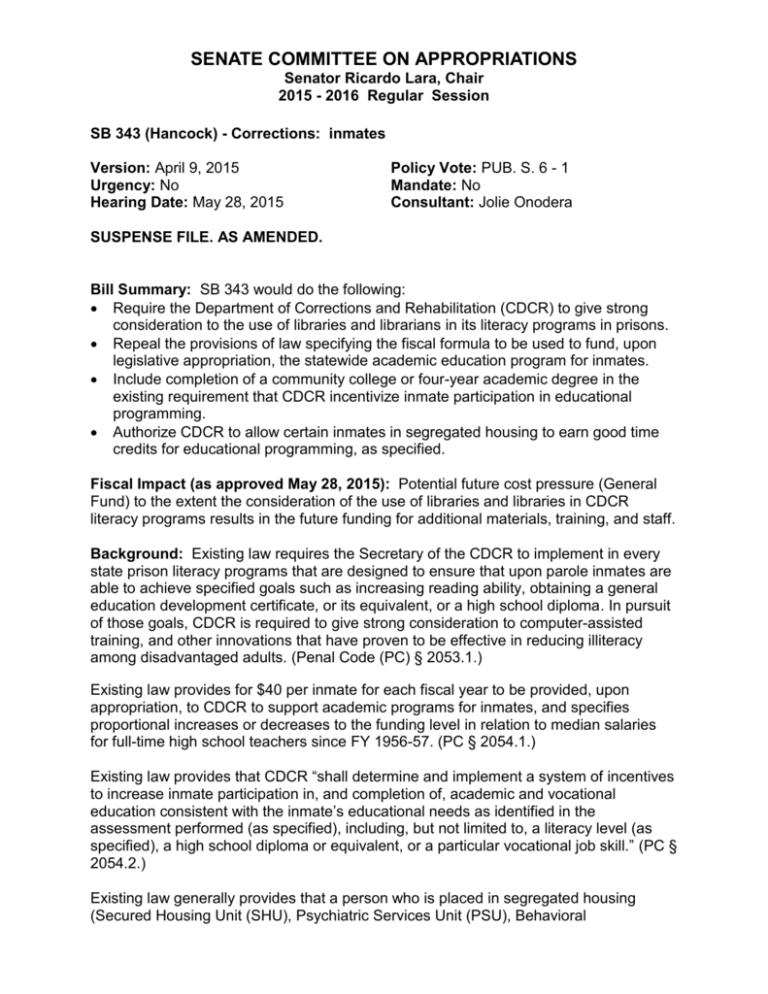
SENATE COMMITTEE ON APPROPRIATIONS Senator Ricardo Lara, Chair 2015 - 2016 Regular Session SB 343 (Hancock) - Corrections: inmates Version: April 9, 2015 Urgency: No Hearing Date: May 28, 2015 Policy Vote: PUB. S. 6 - 1 Mandate: No Consultant: Jolie Onodera SUSPENSE FILE. AS AMENDED. Bill Summary: SB 343 would do the following: Require the Department of Corrections and Rehabilitation (CDCR) to give strong consideration to the use of libraries and librarians in its literacy programs in prisons. Repeal the provisions of law specifying the fiscal formula to be used to fund, upon legislative appropriation, the statewide academic education program for inmates. Include completion of a community college or four-year academic degree in the existing requirement that CDCR incentivize inmate participation in educational programming. Authorize CDCR to allow certain inmates in segregated housing to earn good time credits for educational programming, as specified. Fiscal Impact (as approved May 28, 2015): Potential future cost pressure (General Fund) to the extent the consideration of the use of libraries and libraries in CDCR literacy programs results in the future funding for additional materials, training, and staff. Background: Existing law requires the Secretary of the CDCR to implement in every state prison literacy programs that are designed to ensure that upon parole inmates are able to achieve specified goals such as increasing reading ability, obtaining a general education development certificate, or its equivalent, or a high school diploma. In pursuit of those goals, CDCR is required to give strong consideration to computer-assisted training, and other innovations that have proven to be effective in reducing illiteracy among disadvantaged adults. (Penal Code (PC) § 2053.1.) Existing law provides for $40 per inmate for each fiscal year to be provided, upon appropriation, to CDCR to support academic programs for inmates, and specifies proportional increases or decreases to the funding level in relation to median salaries for full-time high school teachers since FY 1956-57. (PC § 2054.1.) Existing law provides that CDCR “shall determine and implement a system of incentives to increase inmate participation in, and completion of, academic and vocational education consistent with the inmate’s educational needs as identified in the assessment performed (as specified), including, but not limited to, a literacy level (as specified), a high school diploma or equivalent, or a particular vocational job skill.” (PC § 2054.2.) Existing law generally provides that a person who is placed in segregated housing (Secured Housing Unit (SHU), Psychiatric Services Unit (PSU), Behavioral SB 343 (Hancock) Page 2 of 3 Management Unit (BMU), or Administrative Segregation Unit) is ineligible to earn good time credits, as specified. (PC § 2933.6.) Proposed Law: This bill: Requires the CDCR to give strong consideration to the use of libraries and librarians in its literacy programs in prisons. Repeals the provisions of law specifying the fiscal formula to be used to fund, upon legislative appropriation, the statewide academic education program for inmates. Includes completion of a community college or four-year academic degree in the existing requirement that CDCR incentivize inmate participation in educational programming. Authorizes CDCR to allow certain inmates in segregated housing to earn good time credits for educational programming through the establishment of regulations that do the following: o Establish separate classifications of serious disciplinary infractions to determine the rate of restoration of credits; o Specify the time period required before forfeited credits or a portion thereof may be restored; o Specify the percentage of forfeited credits that may be restored for those time periods, not to exceed those percentages authorized for general population inmates; o Provide for credit earning for inmates who successfully complete specific program performance objectives. Related Legislation: SB 759 (Anderson) 2015 would require CDCR to collect specified data regarding inmates subject to a term in a SHU. The bill would require the Inspector General to use the data to prepare reports for the Legislature on specified criteria pertaining to inmates in a SHU and PSU. This bill would also authorize CDCR to establish regulations to allow specified inmates placed in segregated housing to earn credits while placed in segregated housing. This bill recently passed out of the Senate Committee on Public Safety. Prior Legislation: SB 1391 (Hancock) Chapter 695/2014 allows California Community Colleges to receive full funding for credit-course instruction offered in correctional institutions and seeks to expand the offering of such courses. Staff Comments: This bill requires CDCR to give strong consideration to the use of libraries and librarians proven to be effective in reducing illiteracy. The CDCR has indicated this may require CDCR to adjust duty statements for library staff to include skills, engagement, and activity within the literacy program. Formalizing these duty statements may require additional training and development for library staff, however, the costs associated with this additional training and development are unknown. The mandate to create a system of incentives to encourage participation in academic programs leading to completion of a community college or four year academic degree compliments existing law and is not anticipated to have a significant fiscal impact on CDCR. Adjustment of the inmate education incentives may encourage inmates to pursue and obtain a college education, which may allow for their earlier release, thereby reducing incarceration costs and the likelihood of recidivism. SB 343 (Hancock) Page 3 of 3 The CDCR has indicated no fiscal impact associated with repealing the provisions of law specifying the fiscal formula to be used to fund, upon legislative appropriation, the statewide academic education program for inmates. This bill authorizes CDCR to allow certain inmates in segregated housing to earn credits for educational programming. Depending on the eventual content of the programs in these regulations, this expansion could potentially require CDCR to hire additional teaching staff and secure additional facilities in order to accommodate additional students. The magnitude of these costs is unknown at this time, but could be substantial. Staff notes any up-front costs could potentially be offset in future years in whole or in part to the extent the credit-earning ability leads to earlier releases from prison and reduced recidivism. The CDCR would incur one-time costs associated with promulgating regulations to allow specified inmates placed in a SHU, PSU, BMU, or an Administrative Segregation Unit to earn credits during the time he or she is housed in the respective units. CDCR estimates a cost of approximately $100,000 for the promulgation of regulations. Author amendments (as adopted May 28, 2015): Delete Section 5 of the bill, which required CDCR to establish regulations to allow specified inmates placed in a Security Housing Unit, Psychiatric Services Unit, Behavioral Management Unit, or an Administrative Segregation Unit to earn credits. -- END --
